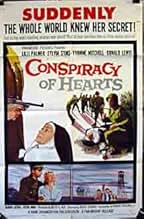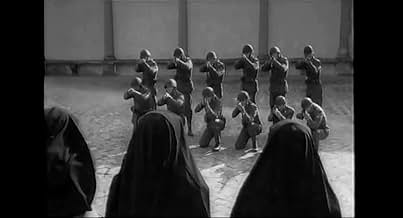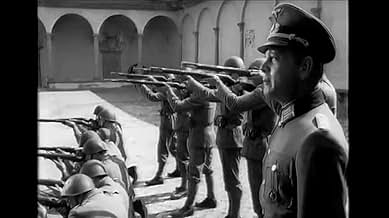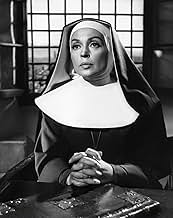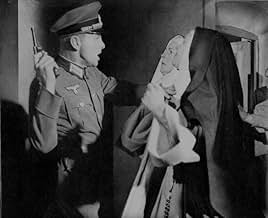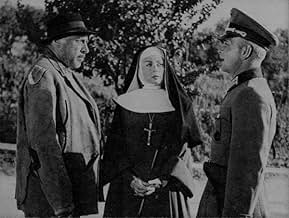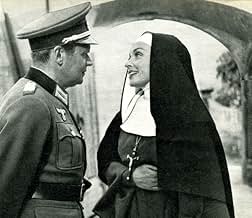Catholic nuns risk their lives to help Jewish children in an Italian internment camp escape to Palestine during World War II.Catholic nuns risk their lives to help Jewish children in an Italian internment camp escape to Palestine during World War II.Catholic nuns risk their lives to help Jewish children in an Italian internment camp escape to Palestine during World War II.
- Director
- Writers
- Stars
- Awards
- 1 nomination total
- Director
- Writers
- All cast & crew
- Production, box office & more at IMDbPro
Featured reviews
Please can this beautiful film regarding Christian suffering and the understanding of standing for principles of truth be re-released on DVD. Even though I am not a Catholic Christian, but of another part of the family of Christ, I attended a Catholic school and I just feel this a really beautiful film.May God Bless all those Christians that risked their lives to save Jews and the weak in Nazi Occupied Europe. I feel these kind of films must be shown to an ignorant generation of people that have forgotten the horrors of World War 2. The wish of those that gave their lives in World War 2 for freedom and peace is that "We don't forget".Even if we look at the World now there is still genocide still taking place against vulnerable people just because they are different or speak different.
10gelashe
I saw this movie as a little girl with my mom. I was too young to understand or appreciate it. I got the opportunity to see it in my twenties and never forgot it. The last time it was shown, I taped it and have never seen it on T. V. again.
The courtyard scene at the end is what I remember most. Other memorable scenes are: the nuns hiding the children at the bottom of the farmer's wheelbarrel while a Nazi officer stabs a pitchfork into it to make sure it is really garbage underneath, the German nun who was angry at hiding the children at the beginning, later winds up saving one of them by hiding her under her habit and the beginning of the film when the nuns asked a little girl her name, and she replies "Jew Dog". She said she had been called that so many times by the Germans that she forgot her real name, and at Yom Kippur when the children read the names of their families who are all dead. This is a wonderful movie. It is a shame it is not available on video or shown on cable.
Lily Palmer as the Mother Superior is outstanding especially noting her beauty.
The courtyard scene at the end is what I remember most. Other memorable scenes are: the nuns hiding the children at the bottom of the farmer's wheelbarrel while a Nazi officer stabs a pitchfork into it to make sure it is really garbage underneath, the German nun who was angry at hiding the children at the beginning, later winds up saving one of them by hiding her under her habit and the beginning of the film when the nuns asked a little girl her name, and she replies "Jew Dog". She said she had been called that so many times by the Germans that she forgot her real name, and at Yom Kippur when the children read the names of their families who are all dead. This is a wonderful movie. It is a shame it is not available on video or shown on cable.
Lily Palmer as the Mother Superior is outstanding especially noting her beauty.
Ralph Thomas and Betty Box belong so firmly to the tale of the British cinema's protracted postwar decline, and their output runs so much to cheerful mediocrity and worse, that it would be churlish not to salute this exception.
A film about a mixed European bag of nuns in sunny Italy, sheltering Jewish children from nasty German occupiers, could have easily wound up as sticky or preachy as a Hollywood movie of the week or after-school special "endorsed by the National Education Association". This production does quite a bit better.
To begin with, the couple took the commercially bold decision to shoot in dramatically suitable monochrome (Rank was very into Technicolor) despite the temptation of those gorgeous locations near Florence. Next, Rank's addiction to polyglot casts proves acceptable, since the nunnery and the Cahtholic church are multinational, as is the war situation: the convention of Colonel Albert Lieven talking in Teutonically accented English and others in Italianate English does not distract.
Thirdly, the cast is well chosen. Sylvia Syms, a rising English rose, was the novice. Michael Goodliffe was a familiar officer/vicar type, decent and tense as the nuns' protective priest. Lilli Palmer, that quintessentially cosmopolitan star, is apt (if a little too soigne) as Mother Superior. Ronald Lewis as the Italian major torn between allegiance to the Axis and revulsion at its persecutions, patronised by Lieven and a worm about to turn, is his customary sombre self. (Both Lewis and Goodliffe were suicides).
Fourthly, the mise-en-scene is ideal for moral conflicts: sunny exteriors and open hillsides against the shadowy cloister and catacombs where the hunt for hidden escapees from a concentration camp culminates. Thomas is no Bresson or da Sica, but he makes good use of his lighting cameraman, and in his workmanlike way keeps the tension boiling. The religious angle (with its dilemmas of obedience, confession and incompatible loyalties) is deftly threaded through the chase to raise the tone.
For a 'U'-certificated production there is an unholy amount of screen time leading up to, and about, killings and executions: it's about younger children but not for them.
As always, Box and Thomas are craftsmanlike, most to be praised for the mistakes and ineptitudes they avoid.
This is not "The Sound of Music" sans music. The storyline is not muffled by subplots, the enemy are not caricatured (Lieven convincingly depicts a non-Nazi career officer, forced into exemplary cruelty by his force's isolation amid partisans) and the slither into sentimentality is avoided nearly all the time. This is the price the script willingly pays for not characterising the children much; on the other hand, the issue of whether nuns gladly harboured Jews and made concessions to Judaism under a Christian roof is not shirked.
Adrian Scott, a member of the Hollywood Ten, outlined a plot based on real incidents which was worked up by Marsha Hunt's longtime husband, Robert Presnell Jr. It was unusual for the Pinewood team to work with Americans, who may have helped keep the film's political aspects uppermost-- and, as it were, salted it with some asperity, so that it plays pretty smartly and kitsch-free today.
Barney Balaban of Paramount saw its premiere while in London and paid Rank handsomely for the rights on impulse. The film fared well in an America not yet used to stories of Nazi anti-Jewish actions: the Auschwitz trial and Eichmann's capture would soon make them too familiar. In Britain, "Conspiracy of Hearts" was one of 1960's top grossers alongside Ralph's and Betty's latest "Doctor" film. Sadly, the latter would be much more typical of them thereafter.
A film about a mixed European bag of nuns in sunny Italy, sheltering Jewish children from nasty German occupiers, could have easily wound up as sticky or preachy as a Hollywood movie of the week or after-school special "endorsed by the National Education Association". This production does quite a bit better.
To begin with, the couple took the commercially bold decision to shoot in dramatically suitable monochrome (Rank was very into Technicolor) despite the temptation of those gorgeous locations near Florence. Next, Rank's addiction to polyglot casts proves acceptable, since the nunnery and the Cahtholic church are multinational, as is the war situation: the convention of Colonel Albert Lieven talking in Teutonically accented English and others in Italianate English does not distract.
Thirdly, the cast is well chosen. Sylvia Syms, a rising English rose, was the novice. Michael Goodliffe was a familiar officer/vicar type, decent and tense as the nuns' protective priest. Lilli Palmer, that quintessentially cosmopolitan star, is apt (if a little too soigne) as Mother Superior. Ronald Lewis as the Italian major torn between allegiance to the Axis and revulsion at its persecutions, patronised by Lieven and a worm about to turn, is his customary sombre self. (Both Lewis and Goodliffe were suicides).
Fourthly, the mise-en-scene is ideal for moral conflicts: sunny exteriors and open hillsides against the shadowy cloister and catacombs where the hunt for hidden escapees from a concentration camp culminates. Thomas is no Bresson or da Sica, but he makes good use of his lighting cameraman, and in his workmanlike way keeps the tension boiling. The religious angle (with its dilemmas of obedience, confession and incompatible loyalties) is deftly threaded through the chase to raise the tone.
For a 'U'-certificated production there is an unholy amount of screen time leading up to, and about, killings and executions: it's about younger children but not for them.
As always, Box and Thomas are craftsmanlike, most to be praised for the mistakes and ineptitudes they avoid.
This is not "The Sound of Music" sans music. The storyline is not muffled by subplots, the enemy are not caricatured (Lieven convincingly depicts a non-Nazi career officer, forced into exemplary cruelty by his force's isolation amid partisans) and the slither into sentimentality is avoided nearly all the time. This is the price the script willingly pays for not characterising the children much; on the other hand, the issue of whether nuns gladly harboured Jews and made concessions to Judaism under a Christian roof is not shirked.
Adrian Scott, a member of the Hollywood Ten, outlined a plot based on real incidents which was worked up by Marsha Hunt's longtime husband, Robert Presnell Jr. It was unusual for the Pinewood team to work with Americans, who may have helped keep the film's political aspects uppermost-- and, as it were, salted it with some asperity, so that it plays pretty smartly and kitsch-free today.
Barney Balaban of Paramount saw its premiere while in London and paid Rank handsomely for the rights on impulse. The film fared well in an America not yet used to stories of Nazi anti-Jewish actions: the Auschwitz trial and Eichmann's capture would soon make them too familiar. In Britain, "Conspiracy of Hearts" was one of 1960's top grossers alongside Ralph's and Betty's latest "Doctor" film. Sadly, the latter would be much more typical of them thereafter.
I first saw this movie in 1960 when I was 10 and was taken to see it with my mother on our weekly Monday night visit to the Cinema. I didn't go out of choice, It was just for me and my mother to get out of my Fathers way so he could get on with jobs about the house. I can't remember many films that I saw at that time but this was one of the few that stuck in my mind. I suppose it was that I could identify with the Children as they were about my age and that it was about the war. Those of us born in the 40's and 50's grew up with stories about the war. It was certainly a topic for discussion I'm our household as my Father had been a radio operator in the RAF from 1939 onwards.
I can remember being deeply moved and disturbed by it even at that young age especially at the climatic ending. Since then I have seen it on TV as it occasionally pops up on UK TV often in the afternoons. The last time it appeared about 18 months ago I took the opportunity to record it on Video. I watch it when I need to renew my faith in mankind as it proves that even in the darkest times, there are people who will risk all for others and their beliefs and that goodness eventually triumphs over evil.
I can remember being deeply moved and disturbed by it even at that young age especially at the climatic ending. Since then I have seen it on TV as it occasionally pops up on UK TV often in the afternoons. The last time it appeared about 18 months ago I took the opportunity to record it on Video. I watch it when I need to renew my faith in mankind as it proves that even in the darkest times, there are people who will risk all for others and their beliefs and that goodness eventually triumphs over evil.
I worry that at some time in the not too distant future the extent of the evil perpetrated during the 1930s and 40s will be forgotten. Watch this film and remind yourself that unless all good people stand strong, every day and every hour, these sort of events will keep happening, over and over again.
In this shocking (certainly for 1960), depressing, heart-breaking, uplifting and surprisingly honest movie, we see that it is only through individuals taking personal responsibility for their actions that we can have any hope of building a world fit for our children.
When I see films like this, and read the positive response from reviewers on IMDb, I still have some hope for the future.
In this shocking (certainly for 1960), depressing, heart-breaking, uplifting and surprisingly honest movie, we see that it is only through individuals taking personal responsibility for their actions that we can have any hope of building a world fit for our children.
When I see films like this, and read the positive response from reviewers on IMDb, I still have some hope for the future.
Did you know
- TriviaIt was the 5th most popular film at the British box office in 1960.
- GoofsThroughout the scenes in which they appear, most of the nuns are wearing make-up. This would be most unlikely for nuns.
- Quotes
German Soldier: Mother of God: I've killed a nun!
- ConnectionsFeatured in Film Profile: Betty Box and Ralph Thomas (1961)
Details
- Release date
- Country of origin
- Language
- Also known as
- Verschwörung der Herzen
- Filming locations
- Certosa di Firenze, Galluzzo, Firenze, Toscana, Italy(Convent exteriors)
- Production company
- See more company credits at IMDbPro
- Runtime
- 1h 53m(113 min)
- Color
- Sound mix
- Aspect ratio
- 1.85 : 1
Contribute to this page
Suggest an edit or add missing content

